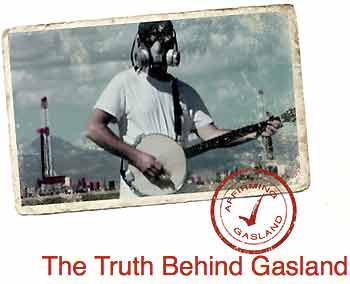From Sourcewatch:
Immediately upon the film's release, Energy In Depth issued a paper claiming to "debunk" the film's documentary evidence.
Energy in Depth (EID) is a pro-oil-and-gas drilling industry front group formed by the American Petroleum Institute, the Petroleum Association of America and dozens of additional industry organizations for the purpose of denouncing the FRAC Act proposed by Colorado U.S. Rep. Diana DeGette to regulate underground fracking fluids.
EID has crafted an entire campaign to delegitimize Fox's film, coining itself "Debunking Gasland." Many Facebook and Google users have even reported "Debunking Gasland" ads popping up on those respective websites.
Josh Fox has responded to every claim in "Debunking Gasland" put forth by Energy In Depth in a piece titled "Affirming Gasland."
History of regulating hydraulic fracturing under the Safe Drinking Water Act (SDWA)
From Affirming Gasland, "Supplemental Reading Section", p. 24.
The Safe Drinking Water Act requires EPA to promulgate regulations for states to administer these provisions of the law in order to protect underground sources of drinking water. However, although the SDWA gave the EPA the authority to regulate underground injection practices, Congress also directed that the EPA should not prescribe unnecessary regulation on oil- and gas- related injection.
Therefore, after the Safe Drinking Water Act passed, the EPA erroneously took the position that hydraulic fracturing did not fall within the regulatory definition of underground injection as provided in the Act.
In 1997 the 11th Circuit Court of Appeals laid the matter to rest when it conclusively ruled in LEAF v EPA, 118 F.3d 1467 (11th Cir. 1997) that hydraulic fracturing activities constituted “underground injection” under Part C of the SDWA.
As a result of the court’s ruling, in 1999 the state of Alabama amended its rules and made hydrofracking subject to the provisions of Part C of the SDWA by requiring Class II permits for each hydrofracking well.
Cheney’s Halliburton (a prime developer and leading practitioner of hydraulic fracturing) began lobbying Washington to exempt fracturing from regulation under the Safe Drinking Water Act.
Then in 2001, during his second week in office, George W. Bush created the Energy Task Force, with Vice President Dick Cheney as chairman. The mission of the task force aimed to “develop a national energy policy designed to help the private sector.” Its final report included a recommendation to exempt fracturing from regulation. Cheney removed the exemption from the draft only after being pressed by EPA chief Christie Whitman.
The exemption surfaced again in the Bush/Cheney Energy Bill of 2003 which did not pass, and reemerged one final time, in the Energy Policy Act of 2005, thanks, in part, to the efforts of Congressmen James Inhofe of Oklahoma and Joe Barton of Texas. To avoid the effect of the ruling in LEAF v EPA, Sec 322 of the Act specifically provides that the term “underground injection” excludes the underground injection of fluids pursuant to hydraulic fracturing operations related to oil, gas, or geothermal production activities. This clause from the law is actually photographed in Gasland at 31:42.
The 2005 Energy Policy Act also altered the Clean Water Act stormwater provisions. Pub.L. No. 109-58, § 323, 119 Stat. 694 (codified as amended at 33 U.S.C. § 1362(24). Section 323 modified the Clean Water Act's definition of an oil and gas exploration and production activity to include oil and gas construction activities. Because the Clean Water Act mandates that the EPA not require a stormwater permit for oil and gas exploration and production activities, it has been argued that the change in the Energy Policy Act of 2005 excluded oil and gas construction activities from stormwater permit coverage, without regard of the size of acreage disturbed.
Previous laws exempted oil and gas drilling, known as oil and gas exploration and production, from Superfund (CERCLA) and RCRA (hazardous waste). CERCLA includes substances that are elements of petroleum as hazardous in Section 101(14), yet crude oil and petroleum are specifically exempt from coverage under the last clause of the section. Thus, hazardous chemicals that would otherwise fall under the ambit of CERCLA are immune from the statute when encompassed in petroleum or crude oil. Likewise, the Solid Waste Disposal Act (SWDA) of 1980 exempted oil field wastes from Subtitle C of the RCRA.
Oil and gas drilling is not typically covered by Clean Air Act permitting since EPA’s CAA regulations do not allow EPA to aggregate or group a set of wells as a single source of air emissions. EPA has proposed rules that if promulgated would allow EPA and the states to aggregate air emissions coming from one company when the facilities are connected to one set of piping.
Some oil and gas machines emit large enough air emissions to be subject to air permit requirements, for example gas dehydradation units emitting over 10 tons per year of volatile organic compounds (VOCs) and gas compressions engines emitting over 50 tons of NOx per year.
However, the industry remains mostly unregulated under this statute by using many smaller compressors and dehydrators which individually emit less VOCs than the limits. If these units were to be aggregated and counted as one larger source (which they should be, in our view) the regulations would be in effect. In addition, neither the diesel engines used to drill nor the volatiles that come off the reserve pits are subject to CAA permit regulations.
For a more complete list of these exemptions please see the following websites:
Earthworks. (2007). "The Oil and Gas Industry’s Exclusions and Exemptions to Major Environmental Statutes."
NRDC. (2007). "Drilling Down: Protecting Western Communities from the Health and Environmental Effects of Oil and Gas Production."
NRDC. (2007). "Toxic Oil and Gas Production Gets a Free Pass to Pollute."
The Energy Policy Act negated the effect of the Alabama LEAF case by expressly defining HF as not subject to the SDWA, provided that HF fluids did not contain diesel; HF that contains diesel remains subject to SDWA limitations.
See: IADC. "Alabama lawsuit poses threat to hydraulic fracturing across U.S." Drilling Contractor. Jan/Feb. 2000.
See: Gasland vs Big Oil and Gas
See: Gasland - The Debate
See: Bushwhacked : Life in George W. Bush's America
See: U.S. Environmental Protection Agency (EPA): Hydraulic Fracturing Study (2010-2012)
Energy in Depth is an oil and natural gas industry informational site.
Since June of 2010, this has been the place to read the rebuttal to Josh Fox's documentary Gasland.
"We’ve spent some time over the past couple months taking a critical look at some of the key assertions made in the HBO documentary Gasland, putting forth in that time two separate rebuttal documents that we believe address in a substantive way a number of the misconceptions upon which the film, and its broader political message, is based.
Read the opposing viewpoints on Energy in Depth as an information source on Sourcewatch Wiki
See: Nora Eisenberg. AlterNet. July 23, 2010. Exposing the Natural Gas Industry's Attempt to Silence Its Critics
Please note that information taken from Wikis should be verified using other, more reliable sources. It is a good place to start research, but because anyone can edit a Wiki, we do not recommend using it in research papers or to obtain highly reliable information.
About Energy in Depth:
"Who We Are: America’s natural gas and oil producers – the majority of which are small, independent businesses with less than 12 employees- are committed to strengthening America through the safe, responsible and environmentally-friendly development of domestic energy resources."
See extensive press-releases and archived press-releases reacting to environmental pressure, presenting the arguments of industry in favor of fracking the Marcelus Shale.
Related:
Lee Fuller. "HF 101: As Cornell Begins Study of Shale Gas Exploration, Energy In Depth Offers Itself Up as Resource for Ad Hoc Panel". Energy in Depth.

Lee Fuller
Mike Hale. The New York Times. June 21, 2010. The Costs of Natural Gas, Including Flaming Water.
Oral Statement Submitted by Mr. Lee Fuller, Representing Independent Petroleum Association of America (IPAA) and Energy In Depth (EID), 3-28-10. (PDF, 3 pp., 46,255 bytes). Submitted to: EPA Scientific Advisory Board (SAB) Environmental Engineer Committee Hydraulic Fracturing Research Plan Review. 4/7/2010- 4/8/2010. The St Regis, 923 16th Street, NW, Washington DC 20006.
See: Drilling Isn't Safe.







